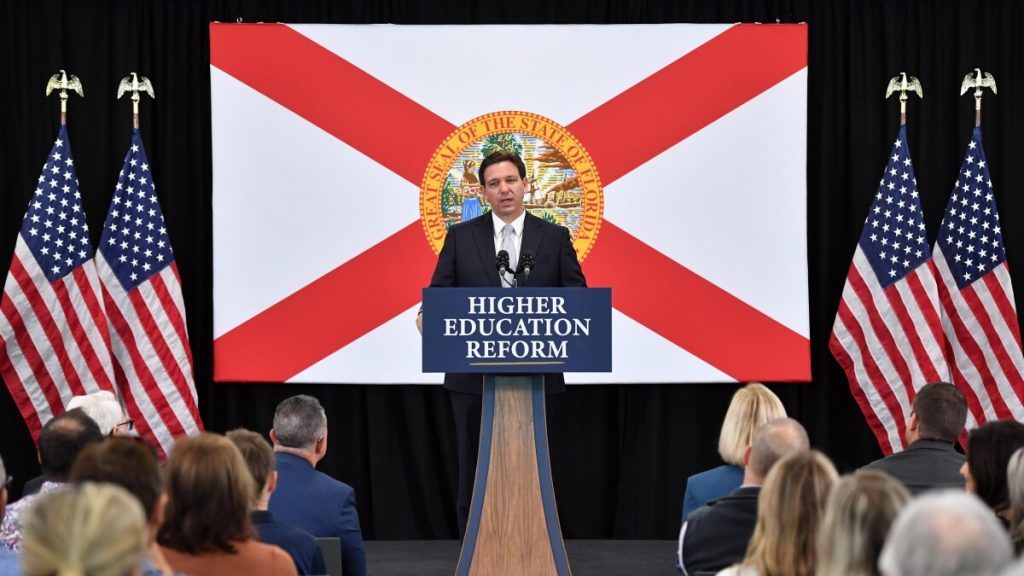In January 2023, Governor Ron DeSantis overhauled the Board of Trustees of the New College of Florida, replacing several members with conservative activists, including Christopher Rufo. New College of Florida was known as a hippie college, a queer college, but Rufo aimed to change all that, saying, “We will be shutting down low-performing, ideologically-captured academic departments and hiring new faculty.” He added, “The student body will be recomposed over time: some current students will self-select out, others will graduate; we’ll recruit new students who are mission-aligned.” His explicit mission included de-queering the college.
This takeover occurred after two and a half years of a Rufo-manufactured panic around “critical race theory” in universities and other symptoms of “wokeism” (code for any discussion of race, gender, and sexuality), and it was a turning point in conservative state interventions in higher education in the United States. Shortly after the takeover, the University of North Carolina at Chapel Hill passed a resolution to establish a conservative campus center in order to create ideological “balance.” Later that spring, Florida passed a new law aimed at decimating public-sector unions — including university workers’ unions — through banning automatic dues collection and setting membership thresholds that would decertify any unions that fail to meet them. Tens of thousands of Florida workers have lost their unions as a result. In April 2023, Texas and North Carolina advanced new laws that would severely weaken the job security offered by tenure. This year, the Indiana Senate is pushing a bill to undermine tenure, undermine diversity initiatives, and require “political diversity” in courses. But if these spring attacks were the Right’s initial forays in a new assault on higher education, the attacks the following fall took a different form, one of explicit neoliberal austerity.
While the attacks discussed above were implemented in early 2023, and those discussed below were mostly announced in the latter half of 2023 and continue to unfold in 2024, any piece of legislation or academic policy process takes a long time to implement. These changes all began much earlier: in the years immediately following the onset of the pandemic, as a set of new shock-doctrine tactics that reacted to and capitalized on the pandemic and the resulting economic crisis. Both federal and state governments initially dedicated large amounts of new spending — trillions of dollars, at the federal level — to address the pandemic, followed by a sharp retraction of investments in an attempt to get people back to work and avoid long-term commitments to social programs, like enhanced unemployment benefits, student loan forgiveness, tenant protections, and investments in public health and education. But the message seems to be “don’t get used to it” — and now we’re feeling the effects. Not only are these spending programs being retracted, but public services like education are beng curtailed even further than before.
“Academic Program Review” Means Program Eliminations
In August, West Virginia University (WVU) announced a plan to eliminate 9 percent of its majors (32 programs total), all foreign-language offerings, and 16 percent of its full-time faculty (169 people). While many of the lost jobs were in the eliminated programs, programs that continued faced mandatory “reduction in force” orders. After significant pushback from students and faculty, the numbers were slightly reduced (28 programs cut, 143 full-time faculty positions eliminated), but even deeper cuts were announced later, bringing total jobs lost up to about 300. This was an enormous blow to the quality of education at the university and to the workers whose livelihoods have been upended. WVU is one of the state’s only two research universities (that is, PhD-granting universities with substantial research activity), heightening the stakes of this decimation for West Virginia residents, especially those who cannot afford out-of-state tuition.
The “academic program review” process and subsequent cuts were conducted at the recommendation of the consulting firm rpk GROUP, which is also contracted by several other universities implementing similar cuts. While WVU was implementing its cuts, the University of North Carolina at Greensboro (UNCG) was conducting a similar process. The university’s administration claimed that it faced a budget crisis (which was found to be false by an independent analysis commissioned by the UNCG chapter of the American Association of University Professors) and impending cuts from the state (which also turned out to be false). The final cuts were announced in February: 20 programs will be eliminated, including the BA in anthropology and the MA in mathematics, even though both programs “met expectations” in the university’s program assessment. The associate dean of the College of Arts and Sciences, who had also been serving as the interim head of the anthropology department, resigned in protest of the academic program review’s mismanagement, alleging that the cuts to anthropology and math were forced onto the college by the provost, despite their programmatic health. While the university claimed that faculty in these programs could keep their jobs until the final students graduated (a “teach out” period), there are reports that faculty are already being asked to resign, and tenured and tenure-track faculty who will be relocated to teaching in other departments will be stripped of their job titles and tenure protections, placed on year-to-year contracts, and subjected to significant pay cuts. Wade Maki, the chair of the UNC system’s faculty assembly who is also a philosophy professor at UNCG, told the Chronicle of Higher Education that Greensboro is only the first of North Carolina’s public universities to make these cuts, and more are coming.
WVU and UNCG are not the only universities facing cuts like these: Vermont State University, Marymount University (Virginia), the State University of New York (SUNY) at Potsdam and Fredonia, the University of Toledo, and Wright State University are also eliminating or proposing to eliminate programs, with the University of Connecticut, University of New Hampshire, Pennsylvania State University, and University of Arizona are all facing significant budget reductions in the near future as well, although it is unclear if these schools are also considering program eliminations. While this new wave is a 2023 phenomenon, the University of Alaska eliminated 39 departments in 2020.
Program eliminations are not taking place only in the humanities and arts, as one might expect. Physics, math, and other STEM programs are also on the chopping block at these schools.
My own university, the City University of New York (CUNY), is also a client of rpk GROUP. Campus workers recently discovered, thanks to a leaked memo from the executive vice chancellor to campus presidents and deans, that academic program review is in our future too, alongside other “cost-saving” (workload-increasing) measures. The threat of program elimination is just one more item to be added to the list of issues we are facing, including significant cuts in funding from the city and the state, campus cuts imposed by CUNY Central administration, vacancies leading to higher workloads, increased class sizes (sometimes increased right before the semester starts), and more.
The memo claims that increasing average class sizes will “not adversely impact educational outcomes,” but teachers and students all know — and research supports this — that smaller classes are better for everyone. A smaller class means teachers can give more individualized attention to each student, but it also means students can build closer relationships with one another and feel more comfortable participating in group discussions; my own students often speak about how much shyer they feel in large groups compared to how they can connect with others in a more intimate environment. On academic program review specifically, the memo says, “The Council on Academic Policy (CAP) is developing parameters to guide this effort based on national practices.” It’s this reference to “national practices” that leads many CUNY workers to suspect the involvement of rpk GROUP and an intended replication of the processes that are leading to hundreds of our colleagues across the country losing their jobs. An informal study conducted by the chair of the CUNY University Faculty Senate estimates that as many as 200 programs could be potential targets for elimination, and the chair acknowledges that program eliminations may well result in meaningful savings only if faculty positions affiliated with them are also eliminated.
When asked about the memo at my own college’s campus-wide faculty senate meeting this month, the university administrators claimed that this is “not a retrenchment memo” and that they have “no plans to eliminate programs” — but the memo clearly anticipates program eliminations, which “national practices” strongly link with retrenchments. They urged the faculty not to worry about the memo and to keep our attention on Albany and the state budget process. But even if my own college administrators are sincere about their intention to maintain programs (and tenured faculty), their sentiments may not be shared by all the other campus leaders, and the memo is very clear, in its discussion of “scheduling optimization,” that our part-time faculty colleagues are on the chopping block. The language of the memo doesn’t even consider part-time faculty real members of the instructional staff, defining the “supply of instruction” as “the number of full-time faculty” and viewing part-timers (many of whom teach the same number of credits as full-timers, for a fraction of the pay) as merely “fill[ing] in the gap.”
Some may think that because we are unionized, program eliminations and retrenchments won’t happen to us. But the faculty at SUNY are unionized too, and it hasn’t saved their jobs. Nor would this be the first time retrenchments have come to CUNY. In the 1976–77 academic year, the Board of Higher Education authorized the retrenchment of 2,000 employees, including those with tenure and job security certificates. While union activism managed to reduce this number significantly (“to less than half” that, according to a union history by Irwin Yellowitz), it was unable to save everyone’s jobs. The union managed to negotiate a new retrenchment plan that required programs to close in order to lay off tenured faculty — this requirement limited how many faculty members were affected, but the university did close programs (including the counseling department at City College and the education department at Queens College). In 1993–94, further retrenchments occurred, including 30 retrenched faculty and two eliminated programs at just one college, CUNY’s flagship campus, the City College of New York.
It’s true that we are better equipped to fight threats like these because we are already organized into a union (for instance, UNCG faculty are running a GoFundMe campaign to raise money for legal fees, because their AAUP chapter doesn’t have union dues to support a legal defense). But being unionized doesn’t mean we can ignore the memo or the prospect of academic program review. It means we have more tools and experience at our disposal — but we need to be ready and willing to use them. “The union” is not an abstract, removed body that will protect us when we are threatened: we are the union, and it’s our collective experiences as organized workers that can prepare us for the battles ahead — battles we will still need to fight. It means organizing for class struggle through rank-and-file mobilizing, not just through lobbying trips and labor-management meetings. It means telling members that this is something we should all be concerned about, and need to take action on. We can’t afford to settle for “good enough” or “it could be worse” — our universities are being destroyed, our colleagues are being fired, and each of us could very well be next.
Imagine a “red state revolt” in higher education, similar to the statewide K-12 teachers’ strikes in 2018 and 2019; imagine higher ed unions aligning their contract expirations — perhaps with the UAW’s call for a May Day General Strike in 2028. Imagine a new wave of shop-floor organizing, in which higher education workers are active as union members not only during a contract campaign or an election year, but year round, organizing in their departments and offices to fight every attack on themselves and their coworkers. Imagine us seizing our power as a segment of the working class, rather than merely hoping for the goodwill of legislators and governors. These are all real tactics we can use, no matter what state we’re in, if we collectively commit to making it happen. And it starts with convincing our coworkers that the threat of program eliminations is both serious and stoppable. I’m writing this article to make the case for both.
Why Is This Happening?
Some of these attacks are centered around higher education’s role as a site of ideological production and social reproduction. This is especially the case in Florida, given the New College takeover and the passing of S.B. 266, which bans colleges and universities from “advocat[ing’ for diversity, equity, and inclusion, or promot[ing] or engag[ing] in political or social activism.” In short, state legislators are trying to censor ideas they deem threatening, calling them “liberal indoctrination.” We see these attacks most acutely at the K-12 level. Earlier this month, a parent of two children enrolled in Miami-Dade Public Schools shared a permission slip he had to sign to allow his child to read a book, because the book’s author is Black. While Florida remains the most egregious example, “Don’t Say Gay” bills modeled on Florida’s have been passed in five states so far and proposed in 23. Governments don’t want children — or adults enrolled in college — to learn about sexual and gender diversity or about systemic racism, ideas that are seen as threats to the roots of America itself.
Other attacks, like the proposed elimination of tenure, have ideological components (undermining academic freedom and empowering universities to fire professors with political views deemed unacceptable), but they also have economic components — and the economically motivated attacks are taking place under both Republican and Democratic governments. Without the protections of tenure, higher-paid faculty can be replaced with lower-paid faculty who receive fewer benefits. For public colleges and universities, less spending also means less public investment and further privatization of public goods. On a recent lobbying trip to Albany, a state legislator told one of my coworkers that significant state investment in public higher education was unlikely to happen unless it could be done in a way that also benefited private industry. The legislature simply doesn’t want to increase funding for higher education, even with a “historically progressive” Democratic supermajority.
It’s true that public university administrations have to work with the amount of funding they receive from the state, but administrators play a role in what that amount is. While the CUNY Board of Trustees requested a larger amount of funding than Governor Kathy Hochul is proposing in the Executive Budget, the Board of Trustees nonetheless reduced its own wish list before making its request to the state, cutting several key items in its initial proposal by 50 percent or more. Why wouldn’t the Board of Trustees want as much money as possible for the university? Research shows that investing in public higher education creates significant returns on investment for the state, and CUNY schools are routinely ranked among the very best for return on investment for students — it’s in the state’s own best interest to fund higher education, and it’s very effective for helping students too. The same is true in California and West Virginia, among other states. Yet higher education is still defunded, reflecting a neoliberal political program of austerity that runs contrary to everyone’s interests. States are committed to spending less and funneling public funds into private hands; higher education is treated like a commodity, to be produced as cheaply as possible and “sold” to students, rather than as a public good that should be available to anyone who wants it.
These program eliminations and budget cuts are not inevitable; there are other solutions to the structural deficits — such as cutting positions in the upper administrations and increasing state funding. A new bill in New York that would tax Columbia and NYU and redirect the funding to CUNY could fix the structural deficit all on its own. We must always remember that austerity is always a policy choice — it is not inevitable. These cuts and academic program reviews are not “best practices for running a university,” as one of the senior officials at my own college called them — they’re mechanisms of neoliberalism, and we must prepare to fight them with everything we have.











